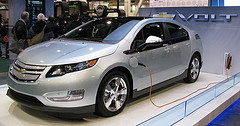NHTSA Investigating Electric Vehicle Batteries Following Chevy Volt Fire
As mass-produced plug-in electric vehicles continue to roll off assembly lines, the National Highway Traffic Safety Administration is taking a closer look at the batteries that power these cars following an incident in which a Chevy Volt caught fire three weeks after undergoing a NHTSA side-impact crash test.
According to Bloomberg, NHTSA has asked the various car makers — including GM, Ford, and Nissan — that manufacture vehicles with lithium-ion batteries about any fire risk associated with these batteries.
Bloomberg reports that the Volt incident occurred last spring at the NHTSA testing center in Wisconsin.
Experts say that if a lithium battery is pierced by steel, a chemical reaction occurs that raises the temperature and can result in a fire. The smaller the piercing, the longer it can take for the fire to happen.
A rep for GM says the company has done more than 300 hours of testing on the Volt and it doesn’t believe the car poses any greater risk to drivers than a conventional automobile.
He tells Bloomberg that both GM and NHTSA tried to replicate the fire but could not. The rep also says that, had the battery been handled according to proper post-crash procedures, the original fire would not have occurred.
“There are safety protocols for conventional cars,” he explains. “As we develop new technology, we need to ensure that safety protocols match the technology.”
Want more consumer news? Visit our parent organization, Consumer Reports, for the latest on scams, recalls, and other consumer issues.


